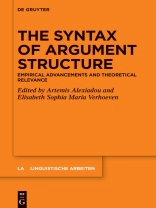Bridging theoretical modelling and advanced empirical techniques is a central aim of current linguistic research. The progress in empirical methods contributes to the precise estimation of the properties of linguistic data and promises new ways for justifying theoretical models and testing their implications. The contributions to the present collective volume take up this challenge and focus on the relevance of empirical results achieved through up-to-date methodology for the theoretical analysis and modelling of argument structure. They tackle issues of argument structure from different perspectives addressing questions related to diverse verb types (unaccusatives, unergatives, (di)transitives, psych verbs), morpho-syntactic operations (prefixation, simple vs. particle verbs), case distinctions (dative vs. accusative, case vs. prepositions), argument and voice alternations (dative vs. benefactive alternation, active vs. passive), word order alternations and the impact of animacy, agentivity, and eventivity on argument structure. The volume will be of interest to theoretical linguists, psycholinguists, and corpus linguists interested in the syntax of argument structure and its modelling using precise empirical methods.
O autorze
Artemis Alexiadou and
Elisabeth Sophia Maria Verhoeven, Humboldt-Universität zu Berlin, Berlin, Germany.












